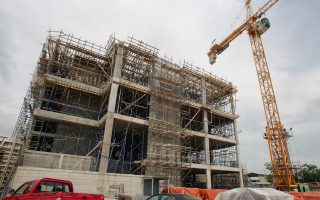Bureaucracy compounding real estate woes

Given the frustrating, costly and time-consuming process involved in the simple transaction of buying and selling property, Greece continues to languish at the lower end of the pile in world rankings regarding the ease of doing business, alongside Third World countries, with some even climbing above it since last year.
Indicatively, the volume of bureaucracy required to sell an apartment is greater than in countries like the Solomon Islands, Uganda, Zimbabwe, Ghana, Cambodia and Somalia.
And the situation is constantly deteriorating, either because documents and supporting documents are continuously being added to the already long list of requirements, or because other countries are improving their own systems, and leapfrogging Greece in the process.
According to the latest annual report of the World Bank on the ease of doing business, Greece placed 156th among 190 countries, as the purchase and sale of a property still requires the collection of 11 different documents and certificates. In the corresponding report for 2019, it was 153rd.
That means those wanting to complete a transaction are required to spend a month (26 working days) gathering the required documents, which lands Greece with the unenviable title of the worst performing among EU member-states. In Norway, all that is needed is one sole procedure and three working days, in Portugal, one procedure and 10 working days, and in the Netherlands, five documents and 2.5 working days. Non-EU countries like Georgia and Qatar require just one document and one working day to complete a transaction.
Among OECD countries, Greece comes in last place (34th). On average, 4.7 documents and 23.6 days are required to complete a transfer in OECD countries.
In recent years, new documents have been added to the pile, such as the ENFIA property tax payment certificate, the energy efficiency certificate, the certificate that the property does not have urban planning violations, and the certificate of payment of real estate tax (TAP). The latter certificate had been abolished in 2014, but, alas, it made a dynamic comeback in 2017.
This huge amount of bureaucracy not only acts as a disincentive to attract foreign investors to the real estate market and to the economy as a whole, but has also pushed up the management costs of real estate under the control of banks, or investment funds, in the process of liquidation of nonperforming loans.
Given this disheartening news, starting in March 2021, the government is planning a series of interventions which are expected to significantly facilitate the process of real estate transfers, including procedures involving donations, parental benefits and inheritances.





